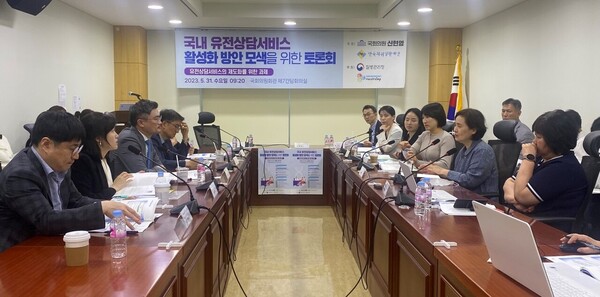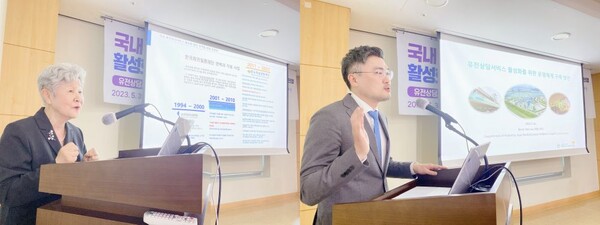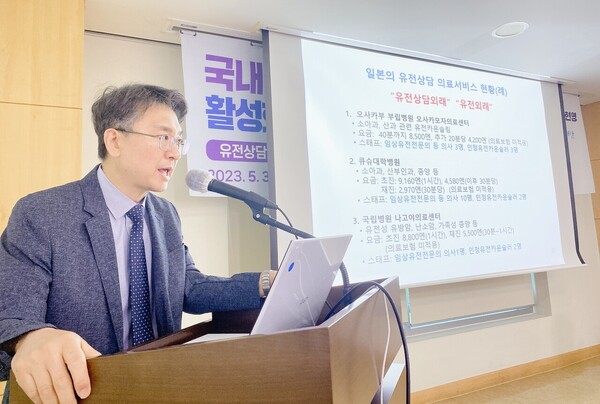
The Rare Disease Management Act, which includes “genetic counseling” in projects helped by rare disease support centers, has passed the plenary session of the National Assembly.
After the passage, experts pointed out that efforts should follow to recognize genetic counseling as a medical practice. The experts said that reinvigorating genetic counseling services can give people with rare diseases and their families the courage to live with their diseases.
Genetic counseling is the process of providing medical and genetic information for patients with rare diseases and their families about the disease, its symptoms and course, and how it is inherited. The Korean Society of Medical Genetics and Genomics has certified 61 genetic counselors since 2015, renewing its certification every five years.
Rep. Shin Hyun-young of the Democratic Party of Korea and the Korea Rare Disease Foundation co-hosted a debate at the National Assembly on Wednesday, pointing out that genetic counseling services in Korea should be recognized as one of the medical services to be revitalized. The debate was sponsored by the Korea Disease Control and Prevention Agency (KDCA) and the Korea Healthlog, a sister paper of Korea Biomedical Review.

“Genetic counseling takes at least 30 minutes, so it cannot be reinvigorated in Korea without insurance benefits,” said Kim Hyeon-ju, foundation chair. “Korea is producing genetic counselors, but it is difficult to encourage their activities because there is no activity code of treatment, so it happens that hard-working counselors do not fail to get recertification.”
Kim emphasized that genetic counseling is essential for patients with rare diseases without adequate treatment and is fatal at the onset.
“We need a medical practice code, and the government’s institutional support so genetic counseling can be established as a medical service in the Korean medical field,” she added.
Professor Lee Beom-hee of the Pediatric and Adolescent Department at Asan Medical Center said it is necessary to establish an operational system to revitalize genetic counseling.
“People with rare diseases need information, such as ‘where are patients like me?’ ‘how are they doing?’ ‘can I have a baby?’ and ‘what state support can I get?’” said Lee, who is conducting a related study in collaboration with KDCA. “Genetic counseling service provides all this information comprehensively.”
The professor explained that research shows that families need more than 30 minutes of explanation, which is impossible (for doctors to do themselves realistically). So, they need genetic counseling services from a team that takes time and provides emotional stability.
“There are three categories (for genetic counseling): pre-visit preparation, counseling, and post-test counseling. We are working on a support project to standardize them and establish a protocol,” Professor Lee said. “We can scale that up and take it to the next business.”
Lee said they would grasp how genetic counseling services are conducted through rare disease hub hospitals nationwide and seek ways to improve the services. He added that through this, they would improve services, including quality control and standardization.
“We aim to provide genetic counseling services in various hospitals, starting with regional hub hospitals,” he added.
The parents of children with rare diseases wanted genetic counseling more ardently.
“Genetic counseling can break the cycle of diseases that run in families and prevent a variety of unfortunate phenomena,” said Eom Chun-hwa, who has a child with Duchenne Muscular Dystrophy (DMD). “I take my kid to the doctor but can’t get genetic counseling in a few minutes.”
Eom added that she needs a doctor with medical expertise and a genetic counselor to give her a detailed and easy explanation (of the disease).
“I would like to receive genetic counseling provided as a right for rare disease patients,” she said. “We need to work together, not just looking at it through the lens of government finances or from the aspect of the profit structure of medical institutions.”
Cho Ae-ri, who has a child with Angelman syndrome, said, “My child diagnosed with a rare disease is now 20 years old, and I still don’t know much about it. When a child is diagnosed with a rare disease, the shock and confusion often cause families to break down.”
Cho expressed her envy of the U.S. and Japan, which have a genetic counseling system.
“I don’t know why Korea can’t do it. It’s urgent to institutionalize it,” she said. “I would like to get health insurance benefits. If not, I would also like to see a way to get services for about 100,000 won ($75) like in Japan.”
Kang Hye-in, a nurse at the Endocrinology Department at Seoul National University Hospital and a genetic counselor, expressed sympathy.
“For patients and families with rare and genetic diseases to receive appropriate genetic counseling, we need to increase awareness of the importance of genetic counseling, improve access and availability, and train and recruit certified genetic counselors to provide professional genetic counseling services,” Kang said.
Lee Hwa-yun, a Chonnam National University Hwasun Hospital genetic counselor, agreed.
“The genetic counseling process is not a one-time event and often requires pre-test counseling, post-test results counseling, additional testing and education for family members, and interdisciplinary care,” Lee said. “Having a dedicated genetic counselor in rare disease centers will help to provide quality services to patients and benefit medical colleagues who work with them.”
Government agrees on the need and vows to explore options
The government agreed that genetic counseling should be available for people with rare diseases. However, officials were cautious about making it reimbursable.
“We recognize the need for genetic counseling for people with rare diseases, and we also recognize that genetic counseling remains an unmet need for people with rare diseases and their families,” said Lee Ji-won, director of the Rare Disease Management Division at KDCA.
Lee noted that the KDCA had started a project to support the operation of the genetic counseling system this year to support them actively.
“We will strengthen support by expanding and upgrading the project so that services can be provided centered on the residence of people with rare diseases,” she added.
Chung Seong-hoon, director of the Insurance Benefits Division at the Ministry of Health and Welfare, said, “Through the discussion, I heard and understood many demands for the institutionalization of genetic counseling. There is no disagreement about the need for genetic counseling services. Still, institutionalization needs to consider the characteristics of the health insurance system.”
Chung noted that the Rare Disease Management Act, which Rep. Lee Myung-soo of the People’s Power proposed and passed the National Assembly, would provide a legal basis for genetic counseling support, helping to reinvigorate the service.
“We will listen to various opinions on what we need to think about to enter the system,” he added.
Contrasting reality in Korea and Japan

At the debate, other experts pointed out that it is necessary to expand educational courses and institutionalize counseling as a medical service to expand genetic counseling services in Korea.
Professor Chung Seon-yong of the Medical Genetics Department at Ajou University Hospital introduced the status of genetic counseling curriculum and medical services in Japan, stressing the need to establish a similar system to expand genetic counseling services in Korea.
According to Chung, Japan provides “genetic counseling outpatient” and “genetic outpatient” medical services at university hospitals. Clinical geneticists, certified genetic counselors (genetic counselors), and nurses work in teams to consult and diagnose genetic diseases and manage patients professionally. A total of 127 medical institutions provide genetic counseling nationwide.
Since genetic counseling is recognized as a medical service, it can be billed as a non-reimbursed service. Kyoto University Hospital, dedicated to educating and treating genetic diseases, has 10 doctors, including clinical geneticists, and five certified genetic counselors working in the genetic outpatient department. Initial consultations start at 9,900 yen (about 93,400 won) for an hour, with an additional 4,950 yen (46,700 won) every 30 minutes. Reexamination fetches 2,530 yen (23,800 won) for 15 minutes.
Major university hospitals across the country, such as Tokyo University Hospital, Osaka University Hospital, and Kyushu University Hospital, operate similar-sized genetic outpatient teams.
Clinical geneticists and certified genetic counselors who work here are also trained nationwide. 2002 the Clinical Genetic Specialist System Committee launched the Clinical Genetic Specialist Certification System. As of March this year, 1,727 people were certified as clinical genetic specialists.
The training of non-physician genetic counselors is also more active than in Korea. Japan launched the Certified Genetic Counselor System in 2005; as of May this year, 356 people have completed the training program. The curriculum, initially launched at two universities, has also been established at 25 graduate schools nationwide.
Korea also started training genetic counselors in 2006 when the Ajou University Graduate School established a master’s program in genetic counseling. Still, there are only 62 genetic counselors certified by the Korean Society of Medical Genetics and Genomics. Only four graduate schools in Korea are concentrated in the Seoul metropolitan region, making it challenging to train genetic counselors actively.
Professor Chung said that genetic counseling training courses concentrated in the greater Seoul area should be expanded nationwide, and the system should be improved to allow medical institutions to provide genetic counseling services even on a non-reimbursement basis.
Chung stressed that the government should allow local graduate schools to develop genetic counseling curricula. In Japan and the U.S., genetic counselors work in hospitals and universities, research institutes, and companies. Korea needs to develop a curriculum that takes this into account to provide genetic counseling in various fields, he added.
“We need to improve the medical service system for genetic counseling, which is currently uncompensated, and strengthen exchanges between university hospital clinics to ensure that genetic counseling is fulfilled,” Professor Chung said.

